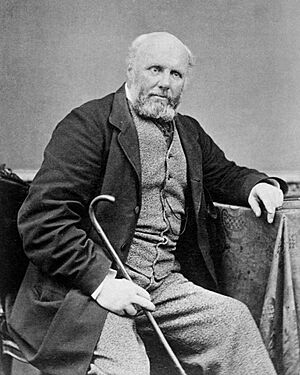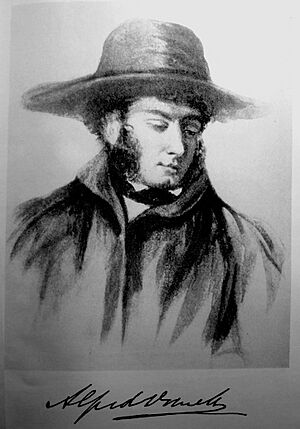Alfred Domett facts for kids
Quick facts for kids
Alfred Domett
|
|
|---|---|
 |
|
| 4th Premier of New Zealand | |
| In office 6 August 1862 – 30 October 1863 |
|
| Monarch | Victoria |
| Governor | George Grey |
| Preceded by | William Fox |
| Succeeded by | Frederick Whitaker |
| Personal details | |
| Born | 20 May 1811 Camberwell, Surrey, England |
| Died | 2 November 1887 (aged 76) London, England |
| Political party | None |
| Spouse |
Mary George
(m. 1856) |
| Children | 1 son |
| Parent |
|
| Relatives | Ernest Dowson (great-nephew) |
| Signature | |
Alfred Domett was an important person in New Zealand history. He was the fourth Premier of New Zealand, which is like being the leader of the country. He was also a talented poet and a close friend of the famous poet Robert Browning. Alfred Domett wrote a long poem called Ranolf and Amohia, a South Sea Day Dream.
Born in England in 1811, he moved to New Zealand in 1842. He lived there for about 30 years and held many important jobs in the government.
Contents
Growing Up and Moving to New Zealand
Alfred Domett was born on 20 May 1811 in Camberwell, England. He went to St John's College, Cambridge, but he left university in 1833. For the next two years, he traveled around the United States, Canada, and the West Indies.
In 1842, Alfred Domett sailed to Nelson, New Zealand, on a ship called the Sir Charles Forbes. He arrived in Nelson on 22 August with many other settlers. The next year, he broke his leg. This injury actually saved his life! It stopped him from going with Captain Arthur Wakefield to a meeting with local Māori people. This meeting turned into a dangerous event called the Wairau Affray, where many settlers and Māori died.
In 1856, Alfred Domett married Mary George, a schoolteacher from Wellington. Mary had two sons from a previous marriage. One of her sons, John, sadly died in a conflict near Tongariro. Alfred and Mary also had a son named Alfred Nelson Domett.
A Poet's Life
Alfred Domett loved to write poetry. His first book of poems came out in 1832. He also wrote for a magazine called Blackwood's Magazine.
When he lived in London, he became very good friends with the famous poet Robert Browning. Browning even wrote a poem about Domett called "Waring," where he wondered what had happened to his friend after he suddenly left London. Browning wrote:
...so I saw the last
Of Waring! ... Oh, never star
Was lost here but it rose afar!
This shows how much Browning admired Domett and believed he would do great things.
Domett's most famous poem is Ranolf and Amohia, a South Sea Day Dream, published in 1872. This long poem describes both European and Māori life in New Zealand. He continued to write poetry throughout his life.
Building a National Library
Alfred Domett played a huge part in starting the General Assembly Library in New Zealand. This library became one of the best of its time. He helped choose the books and organize them. Because of his work, he is seen as a founder of the National Library of New Zealand. This library is very important for keeping New Zealand's history and knowledge.
His Time in New Zealand Politics
| New Zealand Parliament | ||||
| Years | Term | Electorate | Party | |
| 1855–1860 | 2nd | Town of Nelson | Independent | |
| 1860–1866 | 3rd | City of Nelson | Independent | |
After moving to New Zealand, Alfred Domett held many important government jobs. He was the Colonial Secretary for New Munster Province in 1848. He also worked as a commissioner for Crown lands. In this role, he helped name the city of Napier and its streets.
In 1855, the people of Nelson elected Domett to the New Zealand House of Representatives. He represented the area from 1855 to 1866.
From 1862 to 1863, Alfred Domett served as the fourth Premier of New Zealand. One of his biggest achievements as Premier was moving New Zealand's capital city. In 1863, he suggested that the capital should move from Auckland to Wellington, which is in the middle of the country. This idea was approved, and Wellington became the new capital in 1865.
In 1880, he was given an important award, becoming a CMG.
Later Life
Alfred Domett retired in 1871. He and his wife, Mary, moved back to England. He passed away in London on 2 November 1887.
 | Toni Morrison |
 | Barack Obama |
 | Martin Luther King Jr. |
 | Ralph Bunche |


